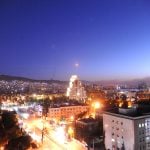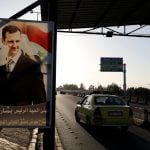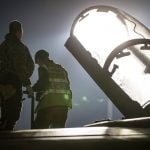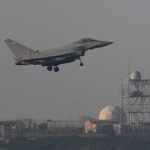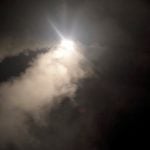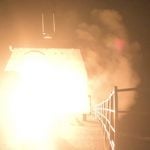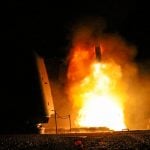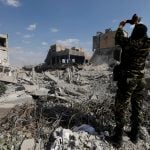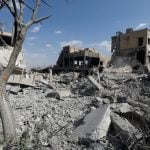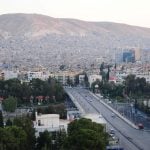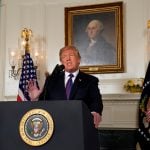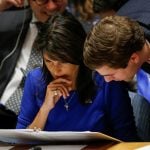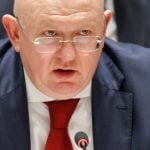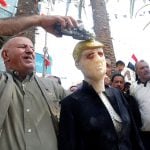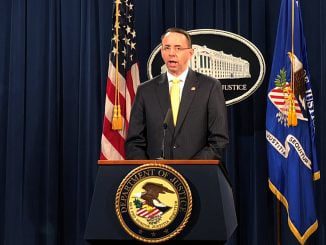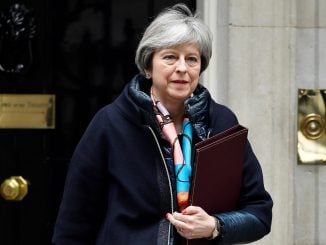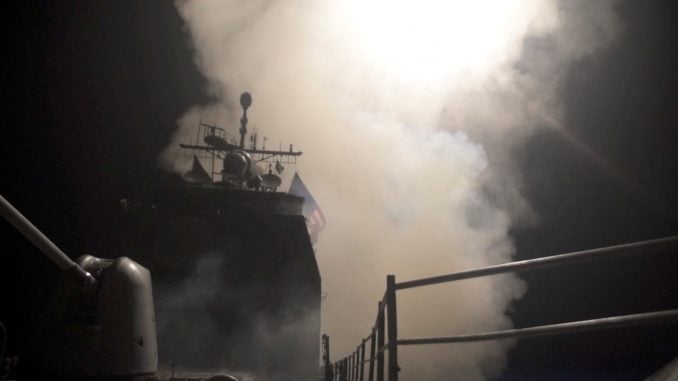
WASHINGTON/BEIRUT – Air strikes by U.S., British and French forces crippled Syria‘s chemical weapons program and all missiles launched hit their targets, the Pentagon said on Saturday as President Donald Trump declared “Mission Accomplished.”
The 105 missiles launched overnight in retaliation for a suspected poison gas attack in Syria targeted three chemical weapons facilities, including a research and development in Damascus’ Barzeh district and two facilities near Homs, Pentagon officials said.
“We believe that by hitting Barzeh in particular we’ve attacked the heart of the Syrian chemicals weapon program,” Lieutenant General Kenneth McKenzie told reporters at the Pentagon.
However, McKenzie acknowledged elements of Syria‘s chemical weapons program remain and he could not guarantee that Syria would be unable to conduct a chemical attack in the future.
Trump called the operation a success in a morning Twitter post and proclaimed: “Mission accomplished.”
A state department spokesperson said Saturday that Russia has been unwilling to bring Syria to the international table to discuss their development and use of chemical weapons, and the strikes are intended to not only destroy capability but also to drive them to the talks. The spokesperson said that the Trump administration has been particularly tough on Russia, more than prior administrations, regarding their support of regimes like Syria’s and destablizing actions around the world.
“We cant stand by as Syria kills hundreds of thousands of people. Countries around the world, including the U.S., have had enough,” said Heather Nauert, spokesperson for U.S. State Department. “We hope that this will be the end of Syria using chemical weapons on its own citizens.”
The bombing represents a major escalation in the West’s confrontation with Syrian President Bashar al-Assad’s superpower ally Russia in a multi-sided war that has killed at least half a million people in the past seven years.
Damascus and Moscow called the strike reckless and pointless.
Syria released video of the wreckage of a bombed-out research lab, but also of President Bashar al-Assad arriving at work as usual, with the caption “Morning of resilience.”
Ten hours after the missiles hit, smoke was still rising from the remains of five destroyed buildings of the Syrian Scientific Research Center in Barzeh, which a Syrian employee claimed medical components were researched and developed.
There were no immediate reports of casualties. Damascus’s allies said the buildings hit had been evacuated in advance. Russia had promised to respond to any attack on its ally, and said on Saturday that Syrian air defenses had intercepted 71 of the missiles fired.
Russian Foreign Minister Sergei Lavrov said on Saturday that U.S.-led strikes on Syria were “unacceptable and lawless.”
The Pentagon said Syria had fired 40 unguided surface to air missiles – but only after the Western strikes had ended. “We are confident that all of our missiles reached their targets,” McKenzie said.
The United States had “deconfliction” contacts with Russia before, during and after the strikes and there was no indication that Russian systems had been employed.
The Western countries said the strikes were aimed at preventing more Syrian chemical weapons attacks after a suspected poison gas attack in Douma on April 7 killed up to 75 people. They concluded Assad’s government was to blame for gassing the Damascus suburb.
British Prime Minister Theresa May described the strike as “limited and targeted,” with no intention of toppling Assad or intervening more widely in the war.
The French government released a dossier that it said showed Damascus was to blame for the poison gas attack on Douma, the last town holding out in a rebel-held swathe of territory near Damascus that government forces have recaptured this year.
“ONE-TIME SHOT”
Washington described its targets as a center near Damascus for the research, development, production and testing of chemical and biological weapons, a chemical weapons storage site near the city of Homs, and another site near Homs that stored chemical weapons equipment and housed a command post.
U.S. Defence Secretary Jim Mattis called the strikes a “one-time shot,” although Trump raised the prospect of additional strikes if Assad’s government again used chemical weapons.
“We are prepared to sustain this response until the Syrian regime stops its use of prohibited chemical agents,” the U.S. president said in a televised address.
The Pentagon said there had been chemical weapons agents at one of the targets, and that the strikes had significantly crippled its ability to produce such weapons.
Russian President Vladimir Putin called for a meeting of the U.N. Security Council to discuss what Moscow decried as an unjustified attack on a sovereign state.
At the meeting in New York, U.N. Secretary General Antonio Guterres urged all members of the Security Council to exercise restraint and avoid escalation in Syria, but said allegations of chemical weapons use demands an investigation.
He said international investigators were ready to visit the site of the suspected attack in Douma.
Syrian state media called the attack a “flagrant violation of international law.” Iran’s Supreme Leader Ayatollah Ali Khamenei called it a crime and the Western leaders criminals.
Inspectors from the global chemical weapons watchdog OPCW were due to try to visit Douma later on Saturday to inspect the site of the suspected gas attack on April 7. Moscow condemned the Western states for refusing to wait for their findings.
Russia, whose relations with the West have deteriorated to levels of Cold War-era hostility, has denied any gas attack took place in Douma and even accused Britain of staging it to whip up anti-Russian hysteria.
But despite responding outwardly with fury to Saturday’s attack, Damascus and its allies also made clear that they considered it a one-off, unlikely to meaningfully harm Assad.
A senior official in a regional alliance that backs Damascus told Reuters the sites that were targeted had been evacuated days ago thanks to a warning from Russia.
“If it is finished, and there is no second round, it will be considered limited,” the official said.
Dmitry Belik, a Russian member of parliament who was in Damascus and witnessed the strikes, told Reuters: “The attack was more of a psychological nature rather than practical. Luckily there are no substantial losses or damages.”
At least six loud explosions were heard in Damascus and smoke rose over the city, according to a Reuters witness.
But the Western intervention has virtually no chance of altering the military balance of power at a time when Assad is in his strongest position since the war’s early months.
In Douma, site of the suspected gas attack, the last buses were due on Saturday to transport out rebels and their families who agreed to surrender the town, state TV reported. That effectively ends all resistance in the suburbs of Damascus known as eastern Ghouta, marking one of the biggest victories for Assad’s government of the entire war.
Russian and Iranian military help over the past three years has let Assad crush the rebel threat to topple him.
The United States, Britain and France have all participated in the Syrian conflict for years, arming rebels, bombing Islamic State fighters and deploying troops on the ground to fight that group. But they have refrained from targeting Assad’s government, apart from a volley of U.S. missiles last year.
Although the U.S. have all said for seven years that Assad must leave power, under the Obama administration, the U.S. held back from striking his government and lacked a wider strategy to defeat him.
The Western powers were at pains on Saturday to avert any further escalation, including any unexpected conflict with their superpower rival Russia. French Defence Minister Florence Parly said the Russians “were warned beforehand,” to avert conflict.
The combined U.S., British and French assault involved more missiles, but appears to have struck more limited targets, than a similar strike Trump ordered a year ago in retaliation for an earlier suspected chemical weapons attack. That strike had effectively no impact on the war.
Mattis said the United States conducted the strikes on the basis of conclusive evidence that chlorine gas had been used in the April 7 attack. Evidence that the nerve agent sarin was also used was inconclusive, he said.
Syria agreed in 2013 to give up its chemical weapons after a nerve gas attack killed hundreds of people in Douma. Damascus is still permitted to have chlorine for civilian use, although its use as a weapon is banned. Allegations of Assad’s chlorine use have been frequent during the war although, unlike nerve agents, chlorine did not produce mass casualties as seen last week.
A U.S. official familiar with the military planning said there could be more air strikes if the intelligence indicates Assad had not stopped making, importing, storing or using chemical weapons, including chlorine. The official said this could require a more sustained U.S. air and naval presence.

